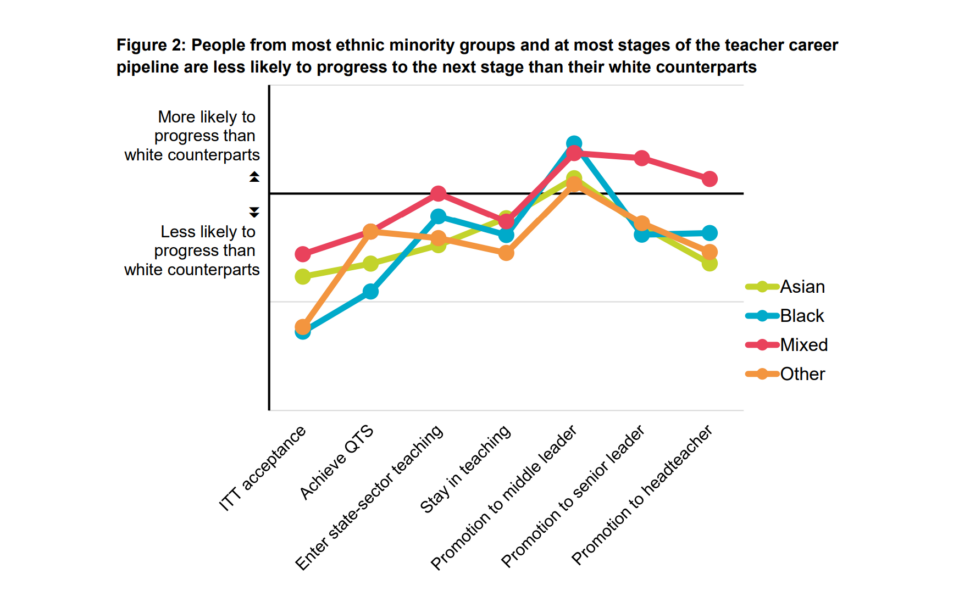Ethnic minority candidates are less likely to be accepted onto teacher training than their white counterparts, despite showing a “clear and obvious interest” in the profession, a new report has found.
Research by the National Foundation for Educational Research also found 86 per cent of state schools have an all-white senior leadership team, and that non-white ethnic groups are underrepresented in headship by as much as 88 per cent.
Education secretary Nadhim Zahawi warned last year that school leadership is not representative of the country at large.
But today’s report, which analysed government, UCAS and Teach First data, shows ministers face an uphill struggle, with non-white ethnic groups under-represented in all stages of the workforce except initial teacher training.
Even then, although those from Asian, black and other ethnic minority backgrounds are overrepresented among applicants to ITT, they are less likely to be accepted than their white peers.
Acceptance rates to postgraduate teacher training are 21 percentage points lower for applicants from black and other backgrounds, 13 percentage points lower for those from Asian backgrounds and 9 percentage points lower for candidates from mixed ethnic backgrounds.
‘Pool of talent not being tapped’
Sufian Sadiq, director of teaching school at the Chiltern Learning Trust, said the report showed “evidence of interest in teaching – from black and ethnic minority candidates – and a pool of potential talent that is not currently being tapped”.
“Addressing the racial disparities that exist within teaching is therefore not only a moral imperative, but increasingly necessary if we want to tackle teacher supply problems.”
Geoff Barton, from the ASCL leadership union, said it made for “uncomfortable reading” that despite a “very clear and obvious interest” in teaching from ethnic minority candidates, “there is a significant drop in acceptance rates when they apply”.
And Emma Hollis, from the National Association of School Based Teacher Trainers said the findings posed “important questions” for the sector.
“We now need to better understand the reasons why acceptance rates to postgraduate ITT courses are lower for applicants from black and other ethnic backgrounds. Once we have that understanding, we can provide the necessary support to the sector and address inequalities quickly and appropriately.”
Non-white teachers less likely to become heads
The report analysed the progression rates of different ethnic groups between different stages in teaching, and found those from most non-white backgrounds were less likely to achieve QTS, enter state-sector teaching and achieve promotion to senior leadership.
Teachers from different ethnic backgrounds were more likely to progress to middle leadership than their white counterparts, however.
But the report said this was driven by a concentration of teachers from ethnic minority backgrounds in London, “where rates of promotion into middle leadership are higher for teachers from all ethnic groups”.
After taking account of differences in characteristics such as region and phase, teachers from Asian, black and other ethnic backgrounds were “significantly” less likely to be promoted to middle leadership.

Barton said disparities in progression were of “great concern”, adding that it was “crucial that we work together as a profession to address these disparities both in the interests of fairness and equality, and in terms of the message we send to children and young people”.
School leadership teams ‘predominantly white’
The research found under-representation of non-white groups was most pronounced at senior leadership and headship levels. For example, 96 per cent of heads are from white ethnic backgrounds, compared to 83 per cent of the wider population.
Among headteachers, mixed ethnic groups were underrepresented by 60 per cent, black ethnic groups by 75 per cent, Asian ethnic groups by 83 per cent and other groups by 88 per cent, compared to the wider population.
The report warned that the trends identified contributed to school leadership teams being “predominantly white”. Eighty-six per cent of state schools in England have an all-white senior leadership team, while 60 per cent have an all-white teaching staff.
The make-up of school leadership teams also has an impact on teacher retention, the report found. Disparities in retention rates were smaller in schools with diverse leadership teams, and larger in schools where all senior leaders were white.
Report author Jack Worth said the research showed we “currently do not have a teacher workforce that reflects the ethnic makeup of wider society and that opportunities to enter and progress within the teaching profession are not equal”.
More research into teacher training needed
The report concluded that leaders and decision-makers in ITT providers, schools and trusts need better support to make equitable workforce decisions. It called for further research, particularly around ITT.
Teacher trainers should also be encouraged to review their application and selection processes, and school leaders should commit to publishing institutional data on diversity.
The government should also conduct regular monitoring of progress in reducing disparities, it said.
A DfE spokesperson said the teaching workforce was “becoming more diverse”, but accepted there was “further to go”.
“We have put in place inclusive recruitment campaigns, tax-free bursaries and scholarships to encourage talented trainees from all backgrounds to teach key subjects, and removed barriers to initial teacher training to encourage applicants from diverse backgrounds.”
















Your thoughts